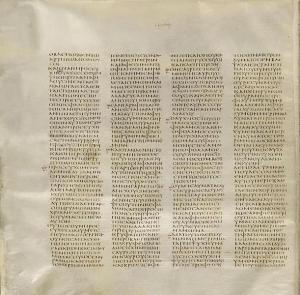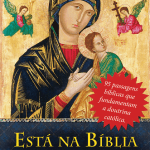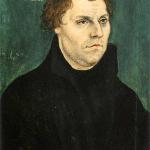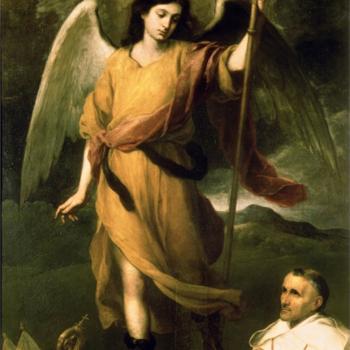John Chrysostom, Athanasius, Basil the Great, Gregory Nazianzen, Cyril of Jerusalem, Cyril of Alexandria, John Damascene
[from my book, The Quotable Eastern Church Fathers: Distinctively Catholic Elements in Their Theology, 2013, 246-253]
[see the complete 38-volume edition of the Church Fathers, edited by Philip Schaff]
Well, then, let us speak to you to-day from the Old Testament. What does it tell us? “Accustom not thy mouth to swearing; neither use thyself to the naming of the Holy One.” And why? “For as a servant that is continually beaten shall not be without a blue mark, so he that sweareth.” (Ecclus. [Sirach] xxiii. 10.) (John Chrysostom, Homily X on Acts 4:1; NPNF1-11)
Let him attend to the Scripture-readings, . . . “The sway of his fury is his destruction” (Ecclus. i. 22); and, . . . “He that is angry with his brother without a cause” (Matt. v. 22); . . . is any one taken captive by love of money? let him hear, that “There is not a more wicked thing than a covetous man: for this man setteth even his own soul for sale” (Ecclus. ix. 9); . . . Is another proud? Let him hear that “God resisteth the proud” (James iv. 6); and, “Pride is the beginning of sin” (Ecclus. x. 14) . . . let each choose out from the Divine Scriptures the remedies for his own hurts. (John Chrysostom, Homily XXIX on Acts 13:16-17; NPNF1-11)
“And a wife,” Scripture says, “that agrees with her husband.” (Ecclus. xxv. 1) (John Chrysostom, Homily XLIX on Acts 23:6-8; NPNF1-11)
And thus elsewhere He saith, (Ecclus. ix. 15.) “New wine is as a new friend: but if it become old, then with pleasure shalt thou drink it:” . . . And again, “The Ancient of days sat,” (Dan. vii. 9.) here again, taking the term “ancient” as among those laudatory expressions which confer highest glory. Elsewhere the Scripture takes the term “old” in the sense of blame . . . (John Chrysostom, Homily XV on 1 Corinthians 5:1-2, 10, v. 5:7; NPNF1-12)
Listen to the Scripture, which saith, “Say not, His mercy is great, He will be pacified for the multitude of my sins.” (Ecclus. v. 6.) (John Chrysostom, Homily IV on Ephesians, v. 2:10; NPNF1-13)
“For into a malicious soul wisdom shall not enter.” (Wisd. i. 4.)[after citing 2 Samuel, Proverbs, and two NT passages] (John Chrysostom, Homily XV on Ephesians, v. 4:31; NPNF1-13)
For if a certain wise man gave this advice in the Old Testament, and said, “Whatsoever is brought upon thee take cheerfully, and be patient when thou art changed to a low estate” (Ecclus. ii. 4.); much more ought this to be the case in the New. (John Chrysostom, Homily XIX on Ephesians, v. 5:18-21; NPNF1-13)
Hear the Scripture that saith, “The bee is little among such as fly, but her fruit is the chief of sweet things.” (Ecclus. xi. 3.) (John Chrysostom, Homily XX on Ephesians, v. 5:26-27; NPNF1-13)
It showed that the Spirit is to come to men through mercy, since God pities and is kind to man. For, “Thou hast mercy upon all,” it is written, “for Thou canst do all things.” (Wisd. xi. 23.) . . . Consider that the world was established by pity, and then imitate thy Lord. “The mercy of man is toward his neighbor, but the mercy of the Lord is upon all flesh.” (Ecclus. xviii. 13.) (John Chrysostom, Homily IV on Philippians, v. 1:30; NPNF1-13)
Nothing is worse than envy and malice; through these death entered into the world. For when the devil saw man honored, he endured not his prosperity, but used every means to destroy him. (Wisd. ii. 24.) (John Chrysostom, Homily XLVIII on John, v. 7:1-2; NPNF1-14)
Let us then repeat to ourselves soothing charms drawn from the holy Scripture, and say, “Thou art earth and ashes.” “Why is earth and ashes proud?” ( Ecclus. x. 9 ), and, “The sway of his fury shall be his destruction” ( Ecclus. i. 22 ): and, “The wrathful man is not comely” ( Prov. xi. 25 , LXX.); . . . (John Chrysostom, Homily XLVIII on John, v. 7:8; NPNF1-14)
And this doctrine is not my own, but Scripture also recognizes the same distinction. “For,” it says, “honorable age is not that which standeth in length of time, and an unspotted life is old age.” (Wisd. iv. 8, 9.) (John Chrysostom, Homily VII on Hebrews, v. 4:16; NPNF1-14)
For hear what the Divine Scripture says, “Give alms, and all things shall be clean.” ( Luke xi. 41 .) And again, “By alms-giving and acts of faithfulness sins are purged away.” ( Prov. xvi. 6.) And, “Water will quench a flaming fire, and alms will do away with great sins.” ( Ecclus. iii. 30.) (John Chrysostom, Homily IX on Hebrews, v. 6:4-5; NPNF1-14)
[B]ecause even with great openness he said, “And as to me, O King, this secret hath not been revealed to me through any wisdom that is in me.” ( Dan. ii. 30.) And again; he was in the den for God’s sake, and when the prophet brought him food, he saith, “For God hath remembered me.” ( Bel and the Dragon, ver. 38.) (John Chrysostom, Homily XXVI on Hebrews, v. 11:27; NPNF1-14)
[I]n his other letters he [Dionysius] calls Him from the Scriptures the word, wisdom, power, breath (Wisd. vii. 25), and brightness of the Father. (Athanasius, On the Opinion of Dionysius, 9 [cf. 15]; NPNF2-4)
But the Lord said, ‘But thou, when thou prayest, enter into thy closet, and shut the door.’ [Matt 6:6] What then will the accuser answer? or rather what will all prudent and true Christians say? Let your Majesty ask the opinion of such: for it is written of the other, ‘The foolish person will speak foolishness;’ [Is 32:6] but of these, ‘Ask counsel of all that are wise.’ [Tobit 4:18] (Athanasius, Apology to the Emperor Constantius, 17; NPNF2-4)
Whence the Jews, as denying the Son as well as they, have not the Father either; for, as having left the ‘Fountain of Wisdom,’ as Baruch reproaches them, [Baruch 3:12] . . . (Athanasius, Four Discourses Against the Arians, II, 42; NPNF2-4)
And this difference divine Scripture recognises, saying concerning the creatures, ‘The earth is full of Thy creation,’ and ‘the creation itself groaneth together and travaileth together;’ and in the Apocalypse it says, . . . and in the book of Wisdom it is written, ‘Having ordained man through Thy wisdom, that he should have dominion over the creatures which Thou hast made.’ [Wisd 9:2] . . . and from Moses in the Song, . . . And Paul in Colossians, . . . (Athanasius, Four Discourses Against the Arians, II, 45; NPNF2-4)
Hence He is not classed with creatures in Scripture, but David rebukes those who dare even to think of Him as such, saying, ‘Who among the gods is like unto the Lord?’ . . . and Baruch, ‘This is our God, and another shall not be reckoned with Him.’ [Baruch 3:35] (Athanasius, Four Discourses Against the Arians, II, 49; NPNF2-4)
[H]ow is it if there is no wisdom, that a ‘multitude of wise men’ are found in Scripture? for ‘a wise man feareth and departeth from evil;’ and ‘through wisdom is a house builded;’ and the Preacher says, ‘A man’s wisdom maketh his face to shine;’ and he blames those who are headstrong thus, ‘Say not thou, what is the cause that the former days were better than these? for thou dost not inquire in wisdom concerning this.’ But if, as the Son of Sirach says, ‘He poured her out upon all His works; she is with all flesh according to His gift, and He hath given her to them that love Him,’ [Ecclus. 1:9-10] . . . (Athanasius, Four Discourses Against the Arians, II, 79; NPNF2-4)
The reader then of divine Scripture may acquaint himself with these passages from the ancient books; and from the Gospels on the other hand he will perceive that the Lord became man; . . . for ‘the Word,’ as John says, ‘became flesh’ (it being the custom of Scripture to call man by the name of ‘flesh,’ as it says by Joel the Prophet, ‘I will pour out My Spirit upon all flesh;’ and as Daniel said to Astyages, ‘I do not worship idols made with hands, but the Living God, who hath created the heaven and the earth, and hath sovereignty over all flesh;’ for both he and Joel call mankind flesh). [Bel and the Dragon, 5] (Athanasius, Four Discourses Against the Arians, III, 30; NPNF2-4)
Let us not fulfil these days like those that mourn, but, by enjoying spiritual food, let us seek to silence our fleshly lusts. For by these means we shall have strength to overcome our adversaries, like blessed Judith [Judith 13:8], when having first exercised herself in fastings and prayers, she overcame the enemies, and killed Olophernes. And blessed Esther, when destruction was about to come on all her race, and the nation of Israel was ready to perish, defeated the fury of the tyrant by no other means than by fasting and prayer to God, and changed the ruin of her people into safety. [Esther 4:16] (Athanasius, Festal Letter #4, 2; NPNF2-4)
There are, then, of the Old Testament, . . . Jeremiah with Baruch . . . But for greater exactness I add this also, writing of necessity; that there are other books besides these not indeed included in the Canon, but appointed by the Fathers to be read by those who newly join us, and who wish for instruction in the word of godliness. The Wisdom of Solomon, and the Wisdom of Sirach, and Esther, and Judith, and Tobit, and that which is called the Teaching of the Apostles, and the Shepherd. But the former, my brethren, are included in the Canon, the latter being [merely] read; nor is there in any place a mention of apocryphal writings. But they are an invention of heretics, who write them when they choose, bestowing upon them their approbation, and assigning to them a date, that so, using them as ancient writings, they may find occasion to lead astray the simple. (Athanasius, Festal Letter #39, 4, 7; NPNF2-4)
For what extent of time is needed by Him who “upholds all things by the word of His power,” [Heb 1:3] and works not by bodily agency, nor requires the help of hands to form and fashion, but holds in obedient following and unforced consent the nature of all things that are? So as Judith says, “Thou hast thought, and what things thou didst determine were ready at hand.” [Judith 9:5-6] (Basil the Great, The Holy Spirit, 19; NPNF2-8)
I pass by the rest, the three young men bedewed in the fire [Dan 3:5], the fugitive prophet praying in the whale’s belly [Jon 2:1], and coming forth from the creature, as from a chamber; the just man in the den, restraining the lions’ rage [Dan 6:22], and the struggle of the seven Maccabees, who were perfected with their father and mother in blood, and in all kinds of tortures [2 Maccabees 7:1]. Their endurance he rivalled, and won their glory. I now turn to the New Testament, . . . (Gregory Nazianzen, Oration XLIII: Funeral Oration for St. Basil the Great, 74-75; NPNF2-7)
And of the Old Testament, . . . of the Twelve Prophets one book, of Isaiah one, of Jeremiah one, including Baruch . . . (Cyril of Jerusalem, Fourth Catechetical Lecture, 35; NPNF2-7)
And the Divine-uttering Baruch, pointing out the Word of God already Incarnate and seen in likeness to us, says, “This is our God, there shall none other be accounted of in comparison of Him, He found out all the way of knowledge and gave it to Jacob His servant and to Israel His beloved: afterward did He shew Himself upon earth and conversed with men.” (Cyril of Alexandria, Tomes Against Nestorius: III, 4; LFC47)
He is all-seeing [2 Maccabees 10:5]: for nothing can escape Him, and over all He keepeth watch. (John Damascene, An Exact Exposition of the Orthodox Faith, I, 9; NPNF2-9)
[I]t is to be observed that the holy Scripture often uses the past tense instead of the future, as for example here: Thereafter He was seen upon the earth and dwelt among men. [Baruch 3:38] (John Damascene, An Exact Exposition of the Orthodox Faith, IV, 6; NPNF2-9)
The divine Scripture likewise saith that the souls of the just are in God’s hand [Wisdom 3:1] and death cannot lay hold of them. (John Damascene, An Exact Exposition of the Orthodox Faith, IV, 17; NPNF2-9)
There are also the Panaretus, that is the Wisdom of Solomon, and the Wisdom of Jesus [Ecclesiasticus], which was published in Hebrew by the father of Sirach, and afterwards translated into Greek by his grandson, Jesus, the Son of Sirach. These are virtuous and noble, but are not counted [by the rabbis] nor were they placed in the ark. (John Damascene, An Exact Exposition of the Orthodox Faith, IV, 17; NPNF2-9)
God is seen clothed in flesh, and conversing with men, (Baruch 3.38) . . . (John Damascene, Apologia Against Those Who Decry Holy Images, I; JDHI)
[St. Gregory Nazianzen: additional references to the Deuterocanon: Judith 5:6 (Oration 45), Wisdom 1:2, 6 (Oration 41), 1:7 (Oration 28), 2:24 (Oration 21, 45), 3:7 (Oration 40), 3:15 and 5:10 (Oration 7), 4:8 (Oration 43), 5:9 (Oration 42), 7:26 (Oration 29), 9:15 (Oration 16), Baruch 3:35, 37 (Oration 30), 3:37 (Epistle 102), Susanna 1:5 (Oration 2), Bel and the Dragon 1:33 (Oration 18), Sirach / Ecclesiasticus 1:2 (Fifth Theological Oration), 3:9 (Oration 2), 3:10-11 (Oration 37), 25:9 (Oration 2, 27), 32:3 (Oration 40), 38:16 (Oration 7), 49:14 (Oration 28) ]
[St. Cyril of Jerusalem: additional references to the Deuterocanon: Wisdom 2:12 (Lecture 13), 6:16 (Lecture 16), 7:25 (Creed of St. Cyril), 13:5: twice (Lecture 9), Baruch 2:25 (Lecture 2), 3:17 (Lecture 8), 3:35-37 (Lecture 11), Susanna 1:45 (Lecture 16), Bel and the Dragon 1:33 (Lecture 14), 1 Maccabees 2:58 (Lecture 14), 2 Maccabees 2:4 (Lecture 2), 9:4 (Lecture 19), 9:27 (Lecture 4), Sirach / Ecclesiasticus 3:21-22 (Lecture 6), 3:22 (Lecture 11), 4:30 (Lecture 15), 4:31 (Lecture 13), 25:1 (Lecture 4), 45:12 (Lecture 22) ]
***
Practical Matters: Perhaps some of my 4,000+ free online articles (the most comprehensive “one-stop” Catholic apologetics site) or fifty books have helped you (by God’s grace) to decide to become Catholic or to return to the Church, or better understand some doctrines and why we believe them.
Or you may believe my work is worthy to support for the purpose of apologetics and evangelism in general. If so, please seriously consider a much-needed financial contribution. I’m always in need of more funds: especially monthly support. “The laborer is worthy of his wages” (1 Tim 5:18, NKJV). 1 December 2021 was my 20th anniversary as a full-time Catholic apologist, and February 2022 marked the 25th anniversary of my blog.
PayPal donations are the easiest: just send to my email address: [email protected]. You’ll see the term “Catholic Used Book Service”, which is my old side-business. To learn about the different methods of contributing, including 100% tax deduction, etc., see my page: About Catholic Apologist Dave Armstrong / Donation Information. Thanks a million from the bottom of my heart!
***
Photo credit: Codex Sinaiticus (4th century): text of Matthew 6:4-32. This manuscript included all seven deuterocanonical books [public domain / Wikimedia Commons]
Summary: John Chrysostom, Athanasius, Basil the Great, Gregory Nazianzen, Cyril of Jerusalem, Cyril of Alexandria, & John Damascene on the seven deuterocanonical books.














